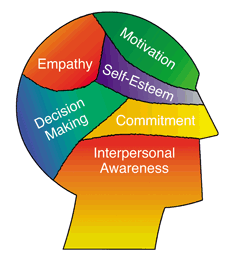Each individual is different and deals with change differently and this is largely due to the way in which people perceive or view the change. When an individual experiences a change, ‘it is filtered through their preferences and appreciated and accepted, or resisted accordingly’ (Dibella. 2007). Unsurprisingly changes that are beneficial to the employee or that align with one’s own personal values are more readily accepted than those that are perceived to be negative.
Scott and Jaffe (1998) propose a model for change which identifies that employees move through four phases; namely denial (a feeling of numbness where the change doesn’t appear to sink in), resistance (feelings of anger, depression, anxiety and frustration), exploration (release of energy and shift in focus to the future which can be exciting and exhilarating) and finally, commitment (when employees are ready to refocus and move ahead). They say that people move through these phases at different rates due to factors such as personal experience or current personal circumstances.
Could emotional intelligence be a way of getting people to the commitment stage quickly?

Emotional intelligence may be described as the ability to utilize your own emotions, and the emotions of others in order to achieve a desired result or action (Chrusciel. 2006) and the level of emotional intelligence in an individual can be measured by tools such as Emotional Intelligence Quotient and the Multifactorial Emotional Intelligence Scale (MEIS) based on the research efforts of Mayer and Salovey (1997).
In the case of employees experiencing organisational change, these individuals would be intensely aware of how they were feeling and reacting to the changes, hence being better able to use this knowledge to guide future feelings and actions. These individuals are also more adaptable to stressful events (Nikolaou and Tsaousis. 2002; Slaski and Cartwright, 2002) and have better coping strategies (Bar-On et al, 2000).
In contrast, those who do not possess high levels of emotional intelligence may let the fear, anxiety and angst of the changes control their behaviour and without an awareness of this, the employees will remain negative and defensive about the changes and resist it at all costs. This point is particularly poignant when you consider research by Fiol and O’Connor (2002) established that ‘emotional energy is essential to mobilise and sustain radical change in combination with cognitive interpretations’; and that being able to use emotions in order to develop positive attitudes towards change and increase ability to cope with change (Huy 1999) is a critical success factor in the change process (Higgs and Rowland. 2002).
Therefore, as emotional intelligence is a skill that can be developed and enhanced with appropriate training, building a workforce of emotionally intelligent employees would be extremely beneficial to the organisation.
Overall, “emotionally intelligent employees will be more likely to be adaptable in emotional reactions to discrepancies signalling the need for change, since these people are more adaptive and responsive to their emotions and moods with better knowledge and understanding of the feelings they are experiencing.” George and Jones (2001).
Something to think about given the amount of change we are currently experiencing…

Pingback: Twitted by DiscussHR